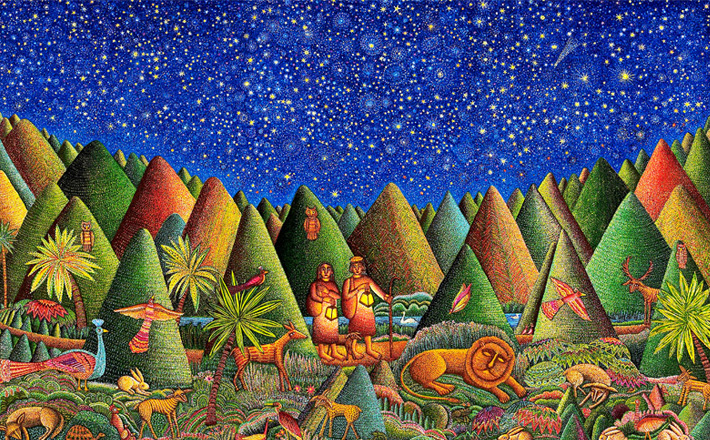Commentary on 1 Kings 18:[17-19] 20-39
This passage is frequently titled “The Contest on Mount Carmel.”
The contest is to prove who is superior: the God of the Israelites, or the Canaanite storm god Baal. The criteria for determining the winner is “the god who answers by fire is indeed God.”
What does it mean to be declared “indeed God” (in Hebrew, “the God”)? The contest focuses on the one who can demonstrate power over the natural world by sending fire. “By fire,” however, is not the only way “the God” answers.
The contest on Mount Carmel calls for fire. What the land and the people most need is water. For three years there had been no rain. While King Ahab and his palace overseer collect grass for the animals of the royal household (1 Kings 18:5), others, such as the widow of Zarephath and the people living in Samaria, face starvation.
King Ahab and his wife Queen Jezebel “served” and “worshipped” Baal. Ahab promoted devotion to Baal by building an altar and a temple for Baal in the Israelite capital city Samaria (1 Kings 16:31-32). Strikingly, during the drought there is no reference to the king, the priests, or the prophets seeking relief from Baal, the “rider of the clouds,” the god of storms and fertility.
Ahab blamed Elijah for the troubles in Israel; Elijah countered that the troubler was Ahab (1 Kings 18:17-18). Elijah instructed Ahab to assemble “all Israel,” the prophets of Baal, and the prophets of Asherah at Mount Carmel.
When the crowd gathers there is no stated agenda, but Elijah is the central voice. From the start, Elijah’s audience is not the king or the Baal prophets — but the people. The text indicates he “drew near to them, to all the people.” While Elijah’s capacity for sarcasm is evident later in this passage, in these verses it is possible to read a tenderness as Elijah approaches the people and asks: “how long will you go limping with two different opinions?” The Hebrew word translated “opinion” (????) is related to a word meaning “tree bough” that might have been fashioned into a crutch creating “unequal legs” 1 and causing an unsteady gait. Elijah is calling the people to pick the god behind whom they can steadily walk.
No one in the crowd responds. Perhaps the people are frightened in the presence of King Ahab and the Baal prophets. Perhaps they don’t know how to pick.
The contest at Mount Carmel is not a model for 21st century religious inquiry. However, many 21st century people are deliberately engaging Elijah’s question of who is “indeed God” for them.
First up in the contest is Baal. Elijah remains the central voice as he instructs the prophets to choose and prepare the bull, and to call on the name of their god. They obediently follow his instructions. “From morning until noon” they cry “O Baal, answer us!” The sound of 450 prophets crying out is met with “no sound”/“no voice” from Baal. Whether it is from exhaustion or panic or because they are moving at different speeds, the Baal prophets “limped about the altar.” They are the ones visibly unsteady in their progress.
Whereas Elijah addressed the people with some respect, he mocks the prophets’ attempt to summon Baal. He calls out insulting excuses for why Baal does not answer, even suggesting Baal is elsewhere relieving himself. 2 Elijah instructs the prophets to call out with a “great voice,” likely knowing their custom of self-mutilation will follow. The NRSV indicates that the prophets “raved on;” they are prophesying in a manner publicly demonstrating their devotion to Baal. They might limp, but it is not an indication of indecision; they are clear about the god they follow.
It must have been after midday – while the Baal prophets continued their appeals – that Elijah invited all the people to “come near” to him (the same verb as in 1 Kings 18:21) and all the people came near (verse 30). Elijah built an altar of twelve stones “in the name of the LORD,” invoking the name of God revealed at Mount Horeb: Yahweh, “I AM WHO I AM” (or “I WILL BE WHAT I WILL BE; Exodus 3:14). Elijah’s actions connect the scene at Mount Carmel with the God who delivered the Israelites from slavery in Egypt, and established with them a covenant through which they could live with one another as “a royal priesthood and a holy nation” (Exodus 19:6). The new altar parallels the 12 stones pulled from the Jordan River when the Israelites entered the promised land behind the ark of the covenant (Joshua 4:1-9). The words which Elijah speaks as he builds the altar are the words with which God blessed Jacob after Jacob had cleared his household of all other gods: “no longer shall you be called Jacob, but Israel shall be your name” (Genesis 35:10).
Elijah had cautioned the Baal prophets not to light the wood on the altar on fire (1 Kings 18:23). He goes to double and triple measures to make certain that any fire on the altar of the LORD will be a divine answer, not a human action.
The fervent appeals by the prophets of Baal continued until “the time of the offering of the oblation” (1 Kings 18:29). Alas, “no sound, no answer, and no response.” At that time Elijah “drew near” and began his appeal to the “LORD, God of Abraham, Isaac, and Israel” (verse 36).
Elijah begins by asking the LORD to make known “this day that you are God in Israel.” This is strikingly personal and local. He does not refer to the prophets of Baal or the dramatic altar arrangement. He never asks for fire. Elijah focuses on the people gathered before him. He calls upon the LORD to answer him so that “this people may know” and “their hearts” may be turned back to God.
Elijah’s appeal to the “LORD, God of Abraham, Isaac, and Israel” continues what he began as he built the altar of stones, connecting the need to choose who is “the God” to the promises made and the prayers answered through previous generations. The God Elijah calls on is no stranger.
While the all-consuming fire in 1 Kings 18:38 will settle the “contest,” fire is not what fundamentally makes the LORD “the God” for Israel.
Notes:
1 Summarized in Alan J. Hauser and Russell Gregory, From Carmel to Horeb: Elijah in Crisis, JSOTSS 85 (Sheffield: Almond Press, 1990), 87, fn 27; see also Francis Brown, S. R. Driver, and Charles A. Briggs, A Hebrew And English Lexicon of the Old Testament (Peabody, MA: Hendrickson Publishers, 1996),704.
2 Summarized in Hauser and Gregory, From Carmel to Horeb, p. 87.
PRAYER OF THE DAY
God of Elijah, with great fire you made your presence known to the worshipers of Baal. Help us to resist the temptation to place our trust and faith in anything other than you. Receive our worship and strengthen our faith. Amen.
HYMNS
Shine, Jesus, shine ELW 671, GG 192, TFF 64
How good, Lord, to be here ELW 315
Lord, dismiss us with your blessing ELW 545, GG 546, H82 344, NCH 77, UMH 671
CHORAL
Holy is the true light, William Harris


November 3, 2019